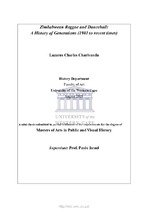Zimbabwean Reggae and Dancehall: A History of Generations (1981 to recent times)
Abstract
The Zimdancehall phenomenon is a growing subculture in Zimbabwe’s entertainment
industry and as such it is attracting scholarly attention, hence the literature around it is
burgeoning. The aim of this research is to trace the beginnings of incorporating Caribbean
inflections, particularly Jamaican, into local music. Its objective is to investigate how reggae
has been received and used in a local context ever since Bob Marley performed on the eve of
independence, until the present Zimdancehall generation.
As a keen music follower, my motivation to study Zimbabwean dancehall music is
another township story located in one of the many of Zimbabwe’s township spaces which I
grew up in. Growing up in the dusty townships of Mkoba in Gweru, rap, hip hop and reggae
were the music we grew up listening to, both at school and at home. I also frequently listened
to dancehall music, which could be downloaded from the internet and shared through CDs
and radio cassettes. Locally, urban grooves was the music of the time, until 2008 when I first
heard the music of Winky D. He provided a different music approach focused on the
downtown and Ghetto/shanty townships. Winky D’s music was strictly dancehall oriented
and it immediately had an impact on the youth including myself.
Going on to study history for post graduate studies, particularly the field of Popular
Culture and Performance, my interest in Zimdancehall was further aroused and I considered
it as an area worthy of study. During the course of this research my interest to carry on was
reinforced by discovering that there is a small burgeoning academic literature that has been
written about Zimdancehall. Most of the literature is found in newspaper and magazines and
entertainment columns, a number of which have been written by Fred Zindi.1 Fundamentally,
Zimdancehall is characterized by its orality in the form of hard hitting-lyrics sung in urban
lingo. It also provides a social commentary on issues such as poverty, unemployment,
hustling or finding ways of getting by, the consumption of drugs as well as criticizing the
maladministration of local government.

